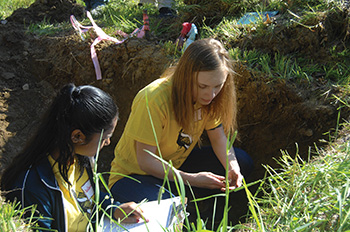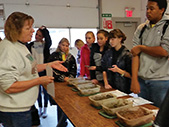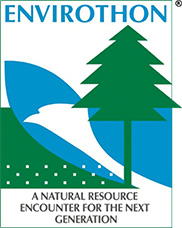By Jean Laughman
As a subscriber to Connecticut Gardener, of course you are a gardener! You may be a hobbyist, botanist, horticultural professional, educator, landscape designer, landscape architect, scientist, etc., and there was a path that led you there, and likely a spark that set you off on the journey.
Your childhood experiences outdoors, exposure to friends and relatives who gardened, and lessons learned both inside and outside of school probably contributed to making you the gardener you are today.
So how can we assure that knowledge and experience is passed to the youth of today? According to Learn.org, statistics from the US Labor Department predict a 9% growth in gardening jobs in the decade between 2018-2028. Who will step into those positions and take over the care of gardens and landscapes, both public and private, and who will be the next horticultural educators, the next plant focused scientists, the next master gardeners or master composters?
Those who work with the soil and plants are implicitly environmentalists, in that they think about relationships – the soil, wildlife, plants, location, conditions … and potential gardeners must learn about and understand these relationships, which might then lead them into the horticultural world for a hobby or career.

The Envirothon Program
Some gardeners are hooked during childhood activities or as members of 4-H, FFA (Future Farmers of America) or through an environmental organization, such as the National Conservation Foundation (NCF) that runs the Envirothon program. The four Envirothon topics – aquatics, forestry, soil, and wildlife – are connected in all ecosystems. Successful gardens and landscapes are based on these connections, and successful gardeners have a good understanding of them.
The purpose of the NCF Envirothon program is to educate grade 9-12 students about the environment and the conservation of natural resources by using hands-on outdoor experiences, academic studies and collaborative competitions. Students from the US, Canada, and China practice problem solving, team-building and critical thinking skills to develop solutions to local and global environmental and natural resource issues.
Career professionals teach science-based fundamentals in the areas of aquatic ecosystems, forestry, soils, land use, and wildlife. Exposure to these topics can lead to academic studies or careers in a wide range of environmental fields.
They can also produce well-informed citizens who can participate in discussions relevant to a community’s well-being and could lead to gardening as a hobby or a career. Once the topics listed below are understood, cultivating a garden and tending a landscape comes much more naturally.
Aquatic Ecosystems
Aquatic ecosystem lessons consider the physical and chemical aspects of water in areas as diverse as wetland and salt marsh areas, streams, lakes, and oceans. Students look at how changes in these non living factors impact sources of drinking water and the organisms living there. In addition, students monitor water bodies for the presence of invasive species that affect the quality of water systems and their recreational value. Envirothon teams are exposed to a variety of Connecticut’s aquatic and moist-land inhabitants.
Forestry
Forestry lessons focus on the plant communities that shape the world. These include an understanding of plant biology, forest and grassland ecology and human impacts on these ecosystems.
Teams learn how forests provide services that humans depend on, including building materials, recreation, natural landscapes, and protection for native wildlife.
They also learn that healthy forest ecosystems improve the quality of soil, water storage, and natural cycles essential for our food supplies. Students are taught identifying features such as bark, leaves, and buds.

Soil
Soil is fundamental to life on earth. From the geological processes that form landscapes to the underground habitats of fungi, decomposers and essential microorganisms, the soil rocks! It helps purify water and transport minerals. Understanding its properties, its structure and how it forms over time and in different environments is part of the program.
Just as the successful gardener knows the importance of organic matter in garden soil, how soil composition affects its ability to hold water, and how to monitor essential nutrients, Envirothon teams look at these factors, as well as good soil management practices.

Wildlife
Wildlife plays an important role in a balanced ecosystem. Gardeners pay attention to what comes and goes in the garden. There are insects, birds, reptiles and amphibians that control unwanted insects and arthropods.
What gardener doesn’t fuss about the herbivores that devour new growth on beloved plants? The alert gardener is constantly on the lookout for egg masses of the spongy moth and spotted lanternfly, and must guard against ticks.
Wildlife’s presence is important for the success of the garden. Think bees, flies, spiders, wasps, birds and other pollinators. Think of the wildlife that either consume and are consumed by other wildlife and help maintain healthy ecosystems.
Envirothon teams, and dedicated gardeners, also recognize the importance of habitat corridors to improve and maintain wildlife populations, and they learn to identify native and non-native species.
CT Envirothon follows the national NCF goals through sponsorship by the state’s five Conservation Districts that provide major financial and professional support for participating teams. The group also receives financial support from professional organizations, such as the New England Association of Soil Scientists, and businesses, including Pratt & Whitney and Collins Aerospace.
Since 1991, more than 46 Connecticut high schools have participated in the annual program, winning the national competition several times, and regularly scoring among the top teams. Many former CT Envirothon participants now have careers with engineering companies, state and local conservation organizations, government agencies, environmental law firms, and academic institutions – and are avid, devoted gardeners.
Teams practice cooperative problem solving and critical thinking skills to improve their knowledge in the four main topic areas and to solve a Current Issue challenge proposed by the national group.
Earning the title of Connecticut’s top Envirothon Team is the result of an annual Field Day competition. To win the state “Best” title, teams must correctly answer written questions composed by professionals from the areas of aquatics, forestry, soils and wildlife. They must also present an oral summary of their solution to a Current Issue scenario, focused on a Connecticut-based environmental or natural resources concern. Connecticut’s winning team earns a paid trip to the national Envirothon competition.
Isn’t this competitive situation similar to what a gardener faces during each growing season? Every gardener annually faces the challenges of too much or too little rain or the arrival of fungal spores or other wind transported disease or insect.
What about dealing with the result of a severe storm that brings down a tree, changing the light in the yard, or the appearance of some new aggressive weed or roaming herbivore?
Learning to work as a team, understanding basic ecosystem concepts and gaining a deeper interest in what makes life work can be the foundation for a lifelong hobby or a satisfying career. Being involved during high school in activities that foster an appreciation of how natural systems are fundamentally integrated can provide professional staff for ecosystem professions and services, or a gratifying hobby. No matter the title you use to describe yourself, a gardener’s life always needs an environmental background!
The 2023 Envirothon is being held in July in Tantramar (formerly Sackville), New Brunswick, Canada. The 2024 competition will be held in Geneva, New York. For more information go to envirothon.org or ctenvirothon.org




